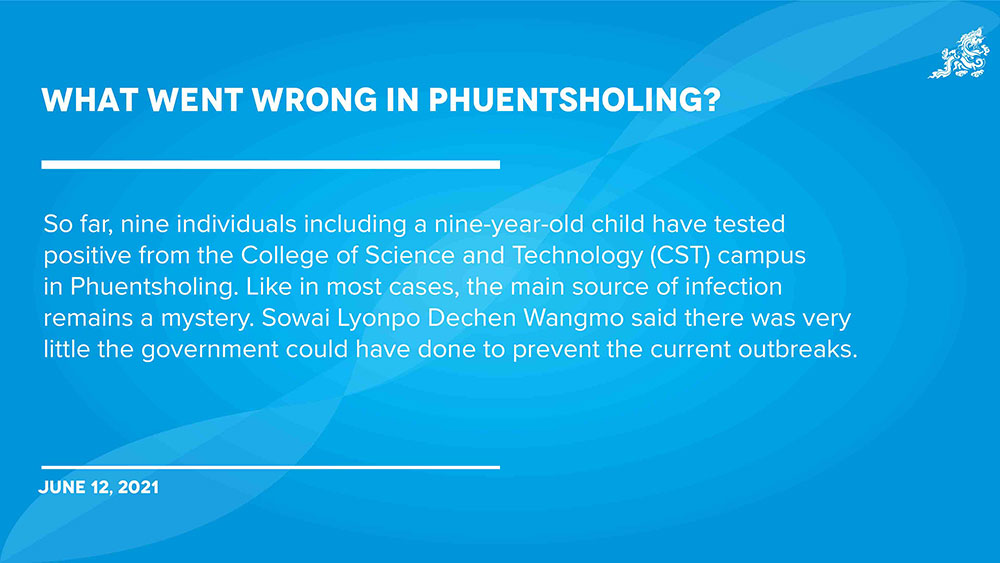More than 10 days after detecting positive cases from the College of Science and Technology (CST) campus in Phuentsholing, the hunt for the source of infection continues.
So far, nine individuals including a nine-year-old child have tested positive from the campus. The outbreak on the campus happened while the entire town and neighbouring areas were under lockdown.
On June 1, the cook of the canteen located within the college campus turned symptomatic and visited the flu clinic. It was learnt that the cook had chronic tonsillitis and he assumed the symptoms to be indications of his existing condition.
However, he tested positive on antigen at the flu clinic and also on the confirmatory RT-PCR along with three other staff of the canteen — the cooks’ primary contacts.
Two college students and a security guard also tested positive in the following days.
Where is the source?
In an outbreak, one of the first measures taken is to trace the source of the infection, besides controlling the transmission. However, in most cases, the main source of infection remains shrouded in mystery.
The same is happening in the CST outbreak, according to health officials. Director of Public Health, Dr Karma Lhazeen, said that while establishing the source of any outbreak helps prevent future outbreaks, it has always been difficult during the pandemic.
“Despite all our efforts, people have not been honest with us,” said Dr Karma Lhazeen, adding that the positive individuals were either afraid of the consequences or that they would drag someone else into the issue.
Dr Karma Lhazeen, currently working with the southern Covid-19 taskforce in Phuentsholing, said that the CST campus was functioning in containment mode when the outbreak occurred.
Besides the people delivering essential goods, no one was allowed to exit or enter the campus. “The infection should have come from outside, meaning that there should be some sort of breach of the protocols because none of the people involved in the essential delivery tested positive so far.”
However, she said that there was no way to establish a breach as none confessed to making any such mistakes.
According to sources, in the absence of a proper boundary wall surrounding the college campus, there are several porous gateways to enter and exit the campus. It was also learnt that none of the expatriate labourers working within the campus tested positive for the virus so far.
Another round of mass testing would be conducted within the campus on the 14th day scheduled next week. A final test would be conducted at the end of the 21st day, following which if there are no positive cases detected, relaxations would be considered within the campus.
Timely intervention
Dr Karma Lhazeen said that the team was expecting more people to test positive from the CST campus but given the timely intervention, the spread has been contained.
She said that on the day the cook and his contacts tested positive, more than 135 college students and about 13 faculty members and their families were heading out from the campus to Thimphu, Paro, and Samtse.
“Immediately after the cook tested positive on antigen, we called up the surveillance teams in Thimphu, Paro, and Samtse to inform about the incoming students to their places,” she said. “The busses were intercepted before reaching Chhudzom and were escorted directly to quarantine centres.”
Dr Karma Lhazeen said that while there was minimum risk associated with these groups of people as they had already completed their seven-day quarantine period and cleared the tests before their departure, they were all quarantined for safety. It was learnt that no one from these groups of students and faculties has tested positive.
What went wrong in Phuentsholing?
The border town identified as one of the high-risk areas in the country continues to be under lockdown since April 16. There is ongoing mass testing (third round) to determine if there are any residual cases in the community including the presence of active transmission of the virus.
Observers say Phuentsholing by virtue of its location and the economic activities, both legal and illegal, has led to this current condition.
Sowai Lyonpo (health minister) Dechen Wangmo said that despite all the measures put in place since day one of the pandemic, there was very little the government could have done to prevent the current outbreaks.
Phuentsholing, Lyonpo said, had a continuous risk of reporting outbreaks as it was surrounded by porous borders. “Despite all the efforts, we cannot make these porous borders watertight.”
She said that outbreaks in Phuentsholing were reported from multiple locations including the quarantine facilities, mini-dry port, factories in Pasakha, and the community as a whole.
“Phuentsholing is under lockdown. And lockdowns are imposed to break the chain of transmission but we continue to get positive cases from the community,” she said. “This clearly shows how effectively the lockdown was imposed and how sincerely the residents follow the protocols.”
Lyonpo said that even during the lockdown when a positive person is detected, he or she has more than 50 primary contacts. “Now how is this possible? It clearly shows that people do not follow lockdown rules.”
The minister added that the government can only do so much in such a situation. “If people do not take individual responsibility, we cannot overcome this pandemic. By now people should understand the implication their single mistake has on the country.”
Lyonpo said: “If everyone takes their own gyenkhu (duty), we can all overcome this pandemic. It is not that difficult. We can no longer have the kudrung mentality and the government cannot come after every individual. Let’s all work together.”
By Younten Tshedup
Edited by Tshering Palden


